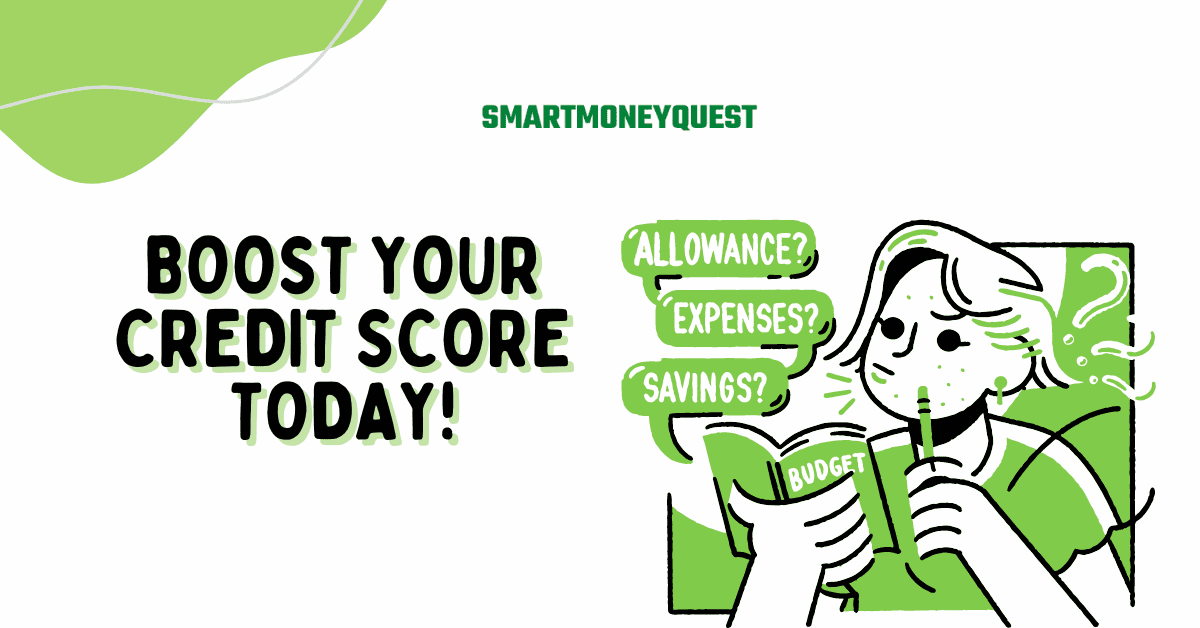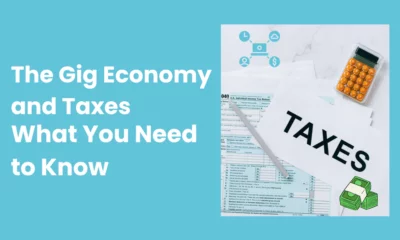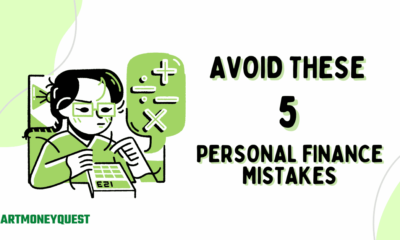Finance
Master Your Money: Top 10 Personal Finance Tips for Beginners

Welcome to the world of personal finance! Whether you’re just starting your financial journey or looking to improve your money management skills, mastering your money is an important step toward achieving financial success. In this blog post, we will share the top 10 essential personal finance tips for beginners. These tips will help you build a strong foundation for your financial future and work towards achieving your financial goals. So, let’s dive into it!
Here is Your Top 10 Personal Finance Tips
1. Create a budget:
The first step to mastering your finances is creating a budget. A budget lets you track your income and expenses, helping you understand where your money is going. Start by listing your monthly income and then categorize your expenses. Make sure your expenses don’t exceed your income and allocate a portion for savings and investments.
2. Emergency Fund:
Putting money aside for an emergency is an important component of personal finance. Set aside a portion of your income regularly in a high-yield savings account. This fund will act as a safety net during unexpected financial emergencies, preventing you from going into debt.
3. Pay yourself first:
Prioritize saving and investing by adopting a “pay yourself first” mindset. Dedicate a percentage of your income to savings and investments before covering your monthly expenses. This practice ensures that you are consistently building wealth over time.
4. Debt Reduction:
Debt can be a financial burden, so focus on paying off high-interest debt like credit card balances and personal loans. Implement a repayment plan and gradually reduce your debt load to free up more money for savings and investments.
5. Invest wisely:
Beginners should start by learning the basics of investing. Consider creating a 401(k) or an Individual Retirement Account (IRA). Diversify your investments across asset classes to effectively manage risk.
6. Set financial goals:
Setting clear financial goals gives you purpose and motivation to manage your money effectively. Whether it’s saving for a dream vacation, buying a home, or retiring comfortably, having specific goals will keep you on track.
7. Educate Yourself:
Financial literacy is very important. Invest time in learning about personal finance through books, blogs, courses, or seeking advice from financial professionals. The more information you have, the better your decisions will be.
8. Automate your finances:
Setting up automatic transfers for savings, investments and bill payments ensures you stay in line with your financial goals. It also limits the possibility of overspending.
9. Review and Adjust:
Review your financial situation regularly and adjust your budget, goals and investment strategies as needed. As your life circumstances change, so should your financial plan.
10. Practice Patience:
Remember that financial success takes time. Be patient and committed to your financial journey. Avoid comparing your progress with others, as everyone’s financial situation is unique.
Mastering your money is an ongoing process, but by applying these top 10 essential personal finance tips for beginners, you’ll be well on your way to financial stability and prosperity. Take control of your finances, set clear goals and be disciplined in your financial decisions. With time and dedication, you can truly master your money and build a secure financial future. For more tips on personal finance tips stay with us.
Read More: Unlock Personal Financial Success : A Budgeting Roadmap to Freedom

Personal Finance
Personal Financial Success A Budgeting Roadmap to Freedom

Budgeting is crucial to your Personal Financial Success. When it comes to personal finance, budgeting is a simple but effective technique that is sometimes overlooked. The key to financial success is a budget, which offers a road map for managing your money, putting money aside for the future, and achieving your financial goals. We will examine the significance of budgeting and how it can help you succeed financially in this comprehensive post.
Budgeting is the cornerstone of personal financial success.
Why Budgeting Matters In Personal Financial Success:
1. Financial Clarity:
Budgeting offers you a crystal-clear view of your financial landscape. It allows you to track your income, expenses, and savings, providing an accurate picture of your financial health. Without a budget, it’s easy to lose track of where your money goes, leading to financial stress and uncertainty.
When you sit down to create a budget, you are essentially conducting a financial audit. You collect all your financial statements, including bank statements, bills, pay stubs, and investment statements, to see the full scope of your income and expenses. This process can be eye-opening, revealing spending habits you may not be aware of. By having this clear financial snapshot, you can make informed decisions about your Personal Financial Success.
2. Smart Spending:
Creating and sticking to a budget helps you make informed decisions about your spending. This enables you to prioritize essential expenses and reduce non-essential expenses. By allocating specific amounts to different categories, such as housing, transportation, groceries, entertainment, and savings, you can ensure that your money goes where it matters most.
Let’s say you discover that you are spending a significant portion of your income on dining out or impulse purchases. With a budget in place, you can set limits for these categories and redirect money toward more meaningful goals, such as paying off debt or saving for a vacation. This new discipline can help you regain control of your finances.
3. Debt Management:
Budgeting is a powerful tool for debt management and reduction. When you have a budget, you can set aside extra funds to pay down debt, whether it’s credit card balances, student loans, or mortgages. This disciplined approach can accelerate your journey to becoming debt-free.
A common budgeting technique is the debt snowball method, where you prioritize paying off your smallest debt first while making minimum payments on your largest debt. As each loan is paid off, you roll over the money you’re using for that loan to pay off the next smallest loan. This creates momentum that can help you eliminate debt faster than you thought possible.
4. Emergency Funds and Savings:
Your emergency fund acts as a cushion when life throws unexpected curveballs your way
Budgeting is not just about managing day-to-day expenses; It is also about preparing for the unexpected and a secure future. By setting aside a portion of your income for an emergency fund and savings, you create a financial safety net that can help you weather unexpected expenses and achieve your long-term financial goals.
Your emergency fund acts as a cushion when life throws unexpected curveballs your way, such as medical bills, car repairs, or job loss. Without it, you may be forced to rely on credit cards or loans, which may exacerbate your financial problems. With a budget, you can consistently contribute to your emergency fund, ensuring you have a financial safety net.
5. Financial Goals:
Whether it’s buying a home, traveling the world, or retiring comfortably, everyone has financial goals. A structured budget allows you to set specific goals and allocate funds to achieve them. It transforms your dreams into actionable plans, turning your aspirations into reality.
Let’s say you want to travel to a foreign destination. With a budget, you can create a dedicated “travel fund” and allocate a portion of your income each month. Over time, this fund grows, bringing your dream vacation within reach. Budgeting turns your goals into tangible, achievable milestones.
How to Start Budgeting:
Now that we’ve established the significance of budgeting, let’s dive into the practical steps to get started:
1. Gather Financial Information:
Start by gathering all your financial information, including bank statements, bills, pay stubs, and investment statements. This will give you a comprehensive overview of your financial situation.
Start by collecting all your financial statements, bills, and pay stubs. You can use a physical copy or a digital version depending on your preference. Organize these documents in a way that makes it easy to refer to them as you create your budget.
2. Set Clear Goals:
Determine your short-term and long-term financial goals. Whether it’s paying off debt, building an emergency fund, or saving for retirement, having clear goals will guide your budgeting efforts.
Take some time to think about what you want to achieve with your money. Your goals can be short-term, such as paying off a credit card within six months, or long-term, such as retiring comfortably at age 65. Write down your goals and be as specific as possible. For example, if your goal is to save for a vacation, specify the destination, estimated cost, and timeframe.
3. Create a Budget:
Use budgeting tools or software to create a detailed budget. Allocate your income to different categories like housing, transport, groceries, entertainment, and savings. Make sure that your expenses do not exceed your income.
There are a variety of budgeting methods and tools available, from the traditional pen-and-paper method to user-friendly budgeting apps and software. Choose one as per your preference and need. The key is to accurately track your income and expenses. Create categories for all of your expenses and assign a specific dollar amount to each category based on your personal financial success goals and priorities.
For example, you might allocate 30% of your income to housing, 15% to transportation, 10% to groceries, 5% to entertainment, and 20% to savings and debt repayment. Adjust these percentages as needed to align with your goals.
4. Track Your Spending:
Monitor your spending regularly to make sure you stay within your budget. This can be done through apps, spreadsheets or even a simple pen and paper method.
Tracking your expenses is an important part of budgeting. This helps you stay accountable and ensures you’re not overspending in any department. Every time you make a purchase or pay a bill, record it in your budgeting tool of choice (4 best free budgeting tools of 2024) . Some apps can even link to your bank account and credit card, automatically categorizing your transactions for you.
Review your budget regularly to see how you’re doing. Are you within your budget, or do you need to make adjustments? Tracking your spending allows you to make informed decisions about your finances and make changes when necessary.
5. Adjust as Needed:
Life is dynamic, and so is your financial situation. Be prepared to adjust your budget as your income and expenses change. Flexibility is key to maintaining a successful budget.
Your budget is not set in stone. It is a flexible tool that can adapt to your changing financial situation and goals. As your income increases or decreases or your expenses shift, your budget should reflect these changes. For example, if you get a raise at work, consider allocating a portion of that extra income to your savings or debt repayment section.
Additionally, life events such as marriage, having children or buying a home can affect your budget. It is essential to review your budget and adjust accordingly to accommodate these changes. The key is to make sure your budget is a useful and accurate reflection of your financial reality.
Budgeting is the cornerstone of personal financial success. It provides clarity, discipline, and direction to your financial journey. By creating and following a budget, you can take control of your finances, reduce stress, achieve your goals, and ultimately secure a brighter financial future. So, why wait? Start budgeting today and take your first step towards financial freedom. Your future self will thank you for it. Budgeting is not a one-time task; It’s a lifelong skill that can transform your financial well-being and bring your dreams within reach. Start budgeting today and begin your journey to your personal financial success.
Read More: How to Create a Personal Financial Plan That Works
Finance
Master Your Money: Avoid These 5 Personal Finance Mistakes
Personal finance mistakes are like roadblocks on the path to financial security, disrupting your journey towards a brighter financial future.

Personal finance mistakes are like roadblocks on the path to financial security, disrupting your journey toward a brighter financial future. Mastering the art of personal finance is the foundation of a secure and prosperous future. However, it’s alarmingly easy to stumble into financial pitfalls that can undermine your financial well-being. In this exclusive guide, we’ll delve deep into the five most common personal finance mistakes, revealing unique insights to sidestep these traps. By understanding these blunders and adopting savvy financial practices, you can construct a robust financial framework and march confidently toward your financial aspirations.
1. Overlooking the Power of a Budget
A pivotal personal finance mistake is the neglect of crafting a budget. Operating without a budget is akin to setting sail without a map. A well-structured budget empowers you to monitor your income, track expenses, and channel resources toward savings and financial objectives. To shield yourself from this error, initiate a monthly budget that meticulously outlines your income and all expenditures, encompassing both fixed obligations and discretionary spending. Regularly review and refine your budget to remain in harmony with your financial targets.
The foundation of financial success lies in avoiding common personal finance mistakes and making sound, informed decisions.
2. Avoiding Lifestyle Inflation and Living Beyond Your Means
Living beyond your financial means is an insidious pitfall that can ensnare you in a web of debt and financial distress. It’s tempting to employ credit cards or loans to sustain a lifestyle that exceeds your earnings, but this behavior can spiral into a fiscal abyss. To elude this danger, place priority on essential needs over indulgences, eradicate superfluous expenses, and construct a financial safety net. Discourage reliance on credit cards for routine purchases, and focus your energies on erecting a solid financial foundation.
3. Neglecting the Menace of High-Interest Debt
The accrual of high-interest debt, particularly via credit cards, can be a formidable impediment to financial security. The compounding interest on such debts can cast a long shadow over your financial horizon. To dodge this hazard, elevate the repayment of high-interest debts to a position of paramount importance. Delve into debt-repayment strategies like the debt snowball or debt avalanche to expedite your journey to financial liberation. Redirect any surplus income, windfalls, or bonuses toward dismantling your debt burden.
In the journey to financial security, understanding the nuances of personal finance and avoiding financial pitfalls can make all the difference.
4. Procrastinating Retirement Savings
Delaying the initiation of retirement savings is a prevalent financial oversight that can extract a substantial toll over time. The potency of compound interest underscores the importance of early retirement planning. To sidestep this pitfall, contribute diligently to retirement vehicles such as a 401(k) or an Individual Retirement Account (IRA) as soon as you are able. Seize the opportunities presented by employer-sponsored retirement plans, especially when they extend matching contributions.
5. Failing to Cultivate an Emergency Fund
Another cardinal blunder is neglecting to establish an emergency fund. Without a financial cushion, unforeseen expenses can leave you vulnerable to reliance on credit cards or loans, exacerbating your financial quandaries. To shield yourself from this predicament, embark on the journey of building an emergency fund that can weather at least three to six months of living expenses. Initiate the process with modest contributions from your income, persistently accumulating until you attain your target.
Personal finance mistakes can cast a long shadow over your financial destiny. By discerning and actively evading these top five errors—neglecting to create a budget, succumbing to lifestyle inflation, ignoring high-interest debt, deferring retirement savings, and overlooking the importance of an emergency fund—you can seize control of your financial destiny. Remember, the pathway to financial prosperity commences with prudent financial habits and informed choices. Launch your journey today and secure a brighter, financially robust tomorrow.
Read More: Unlock Financial Freedom: Improve Your Credit Score Today!
Finance
Unlock Financial Freedom: Improve Your Credit Score Today!
Unlock financial opportunities with our detailed article on improve your credit score. Discover actionable strategies to boost your creditworthiness and secure a brighter financial future.

In today’s financial landscape, your credit score is not just a number; it’s a key that can unlock or restrict your access to countless opportunities. Improve Your Credit Score Today, whether you’re dreaming of owning a home, starting a business, or simply enjoying lower interest rates, a healthy credit score is your ticket to financial freedom. In this extensive 1000-word guide, we will delve deep into the world of credit scores, understand their significance, and explore proven strategies to not only improve but also maintain an excellent credit score. So, fasten your seatbelts and embark on this journey to financial empowerment.
1. Decoding Credit Scores
Before we delve into the strategies to improve your credit score, let’s demystify the concept itself.
What is a Credit Score?
A credit score is a three-digit number that represents your creditworthiness. Lenders, banks, and even landlords use it to assess the risk of extending credit to you. The most widely recognized credit scoring model is the FICO score, which ranges from 300 to 850, with higher scores indicating lower credit risk.
2. Why Does Your Credit Score Matter?
Understanding why your credit score is so significant can be the first step toward taking control of your financial destiny.
Access to Credit
A good credit score opens doors to various financial opportunities, including loans, credit cards, and mortgages. Lenders are more likely to approve applications from individuals with higher credit scores.
Lower Interest Rates
With an excellent credit score, you can secure loans and credit cards with lower interest rates. This translates into significant savings over the life of a loan.
Housing Opportunities
Landlords often check credit scores when deciding whether to rent their properties to you. A higher credit score can improve your chances of securing your dream home.
Employment Prospects
In some industries, employers use credit scores as a part of their hiring process. Maintaining a good credit score can enhance your job prospects, especially for roles involving financial responsibility.
3. Strategies to Improve Your Credit Score
Now that you comprehend the importance of your credit score, let’s dive into actionable strategies to elevate it.
Check Your Credit Report
Start by obtaining free copies of your credit report from all three major credit bureaus—Equifax, Experian, and TransUnion. Scrutinize these reports for inaccuracies or discrepancies and dispute any errors you discover.
Timely Bill Payments
Consistently paying your bills on time is the single most critical factor in improving your credit score. Set up reminders or automatic payments to ensure you never miss a due date.
Reduce Credit Card Balances
Credit card utilization, or the percentage of your credit limit you’re currently using, plays a vital role in your credit score. Aim to keep your balances below 30% of your credit limit, as higher utilization can negatively impact your score.
Don’t Close Old Accounts
Closing older credit accounts can shorten your credit history, which may lead to a lower credit score. Keep your older accounts open and use them responsibly to maintain a positive credit history.
Diversify Your Credit
A diverse mix of credit types, including credit cards, installment loans, and mortgages, can positively influence your credit score. This demonstrates your ability to manage various types of credit responsibly.
Limit New Credit Applications
Each credit application results in a hard inquiry on your credit report, which can temporarily lower your score. Only apply for new credit when it’s necessary to avoid unnecessary inquiries.
Become an Authorized User
If you have a trustworthy friend or family member with a well-managed credit account, consider asking them to add you as an authorized user. Their positive credit history can potentially benefit your score.
Seek Professional Help
If your credit score is exceptionally low or you’re struggling to manage your debts, it might be wise to consult a credit counselor. They can provide personalized guidance and help you develop a plan to improve your credit.
4. Maintaining an Excellent Credit Score
Improving your credit score is an ongoing process that requires discipline and responsible financial management. Here are some tips for maintaining an excellent credit score once you’ve achieved it:
* Continue paying bills on time and in full.
* Monitor your credit reports regularly for any discrepancies.
* Avoid maxing out your credit cards or carrying high balances.
* Be cautious about closing credit accounts.
* Limit new credit applications to only what’s necessary.
* Keep a healthy mix of credit types.
In the realm of personal finance, your credit score is your financial report card. A good credit score can open doors to opportunities, while a poor one can limit your financial choices. By understanding the significance of your credit score and implementing the strategies outlined in this comprehensive guide, you can take control of your financial future, secure better interest rates, and ultimately achieve the financial freedom you deserve. Remember, your journey to a better credit score may take time, but with patience and persistence, you can pave the way to a brighter financial future.
Read More: How to Create a Personal Financial Plan That Works

 Stock Market6 months ago
Stock Market6 months agoBeginner’s Guide to Dividend Investing Stocks for Long-Term Growth

 Side Hustle5 months ago
Side Hustle5 months agoFrom Passion to Profit: Exploring Side Hustles for Artists

 Side Hustle5 months ago
Side Hustle5 months agoHow to Earn Extra Cash: Top Side Hustles for College Students

 Side Hustle5 months ago
Side Hustle5 months ago10 Side Hustles for Women to Diversify Their Income

 Make Money Online5 months ago
Make Money Online5 months agoWays To Make Money Online: 10 Proven Strategies for Beginners












Pingback: How to Create a Personal Financial Plan That Works
Pingback: Recipes & Meal Planning for Frugal Cooking